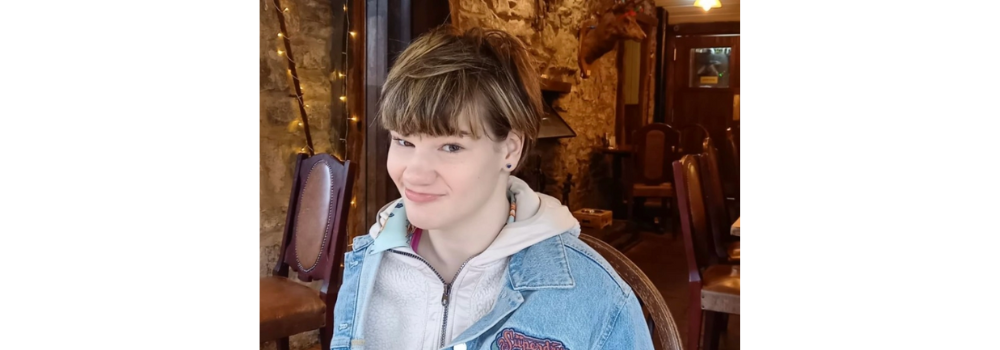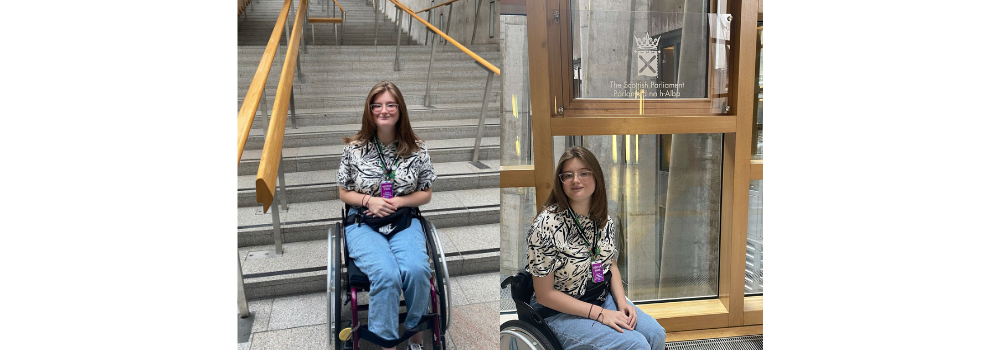As part of Cerebral Palsy Awareness month, Melissa shares her experiences of education as a person with cerebral palsy.
Melissa is a young author and disability activist. Growing up, writing was the most effective way she could communicate. Melissa has her own blog called Buttons and Ramps which you can find here – https://buttonsandramps.wordpress.com
Going to school with cerebral palsy – Melissa Cassidy.
School – the foundations of almost every modern life or at least somewhere parents can temporarily abandon their annoying children. Regardless of how you see it, everyone has a different experience of school. When you have a disability though it adds a whole new layer of physical, emotional and social challenges. I want to share my experience of education in the hope that it illuminates what going to school can look like when you have a disability.
Let’s start at the beginning: after a traumatic birth my parents are left with a (abnormally good looking) disabled baby and a future of uncertainty of what my life was going to be. They didn’t know where to send me to go to nursery until the health visitor suggests a special nursery conjoined with a school called Kelburn Park. My parents didn’t know too much about disability but decided to check it out as an option. My mum tells me that the first visit we had I came out with a beaming smile and begged her to let me go there. The nursery was perfect for me and I honestly don’t have one bad memory of it. My mum said it was quite scary at first as they collected the kids from their homes to take to nursery and she didn’t enjoy having to hand me over every morning which is ironic because she’d probably love a moment of peace like that nowadays. I was a really happy, outgoing child so at nursery I could often be found pretending to perform plays, writing stories and painting.
Special nursery was definitely the right place for me but things changed when I went into primary one at the special school. While I was having fun, my parents grew concerned that by Christmas in primary one I hadn’t really developed my reading skills and by the end of the year they made the tough choice to move me into mainstream school. While this wasn’t easy, they felt I needed the same level of education as my sister. Ultimately this was the right decision, although I was starting a year late I settled in really well. This kickstarted the phase of me realising that I was different to my peers which got me down for a few years and definitely affected the way I felt about myself but I was fortunate to be relatively included and accepted by my peers and definitely flourished at my primary school.
Then came Secondary school and this is where I really started struggling. The first year at Secondary school, I found it incredibly difficult to make friends as I watched most of my other friends find other friendship groups while I struggled to speak to people because I was so self-conscious. This also resulted in me having some resentment against my helpers at school because I just wanted to be “normal”.
Looking back, I wish I had had better role models and more confidence as my lack of confidence then has definitely had a ripple effect on where I am now. Eventually I had to let go of the internal desperation to be like everyone else and this is where I started forming better relationships with my assistants and even made a few friends. Forming that bond with my assistants especially my closest one whom I often refer to as “my second mother” was crucial to me getting my confidence back.
Another thing that had a huge impact on my confidence was the arrival of a new drama teacher, in the space of a month I went from silently loathing drama to confidently laughing and performing with my class. Once I felt that encouragement nothing stopped me and I actually ended up getting a drama qualification two years after.
What I’ve learned about going to mainstream school is that confidence in yourself is everything. I lost a lot of time in my life being self-conscious and not wanting to put myself out there when that is the only way you are going to thrive in a mainstream school. My family and I have all been through an incredibly transformative journey as I’ve gone through school but the opportunity to get that mainstream education has been entirely worth it.


